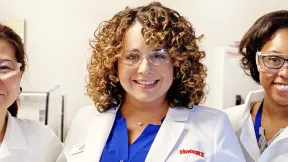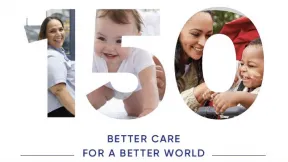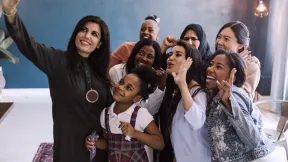Social Impact
People around the globe benefit from our products in their day-to-day lives, but millions worldwide remain in need, lacking access to basic products and services that could dramatically improve their quality of life. Our social impact programs aim to advance the wellbeing of 1 billion people in vulnerable and underserved communities by 2030 while simultaneously expanding our base of retailers, customers and distributors, driving innovation, and enhancing our brands. Through the reach of our brands and brand-led advocacy, social impact programs and partnerships, and investments in the communities where our employees live and work, we aim to exemplify our purpose to deliver Better Care for a Better World. We position our company for success in a changing world by working to address some of the most pressing societal needs identified by the UN Sustainable Development Goals. These include: SDG 3—Good Health and Well-Being; SDG 5—Gender Equality; and SDG 6—Clean Water and Sanitation, with an emphasis on driving meaningful and sustainable change in the focus areas of women’s and girls’ empowerment, access to sanitation and maternal and infant health.
Aspiration & Goal
Advance the wellbeing of 1 billion people in vulnerable and underserved1 communities through innovation and programs that deliver essentials to them.
Strategy & Approach
To guide our efforts and help unlock meaningful societal benefits, we have identified three strategic focus areas that align with key UN Sustainable Development Goals:
- We care for the health and well-being of people at all stages of life (SDG 3)
- We challenge stigmas and champion the progress of women everywhere (SDG 5)
- We champion a world where all enjoy access to clean water, sanitation, and hygiene (SDG 6)
Caring for Health & Well-Being
Our brands are leading efforts to positively impact the health and well-being of people at every stage of life. Our focus is on working to promote everyone’s ability to meet their basic hygiene needs and supporting better hygiene confidence through education and behavior change.
Our Huggies® brand program activates these objectives with a focus on babies and new parents. The program helps to provide babies with quality service (including neonatal care), create baby-friendly environments at hospitals and clinics, train frontline workers to provide essential services for young children, and support families with educational materials and access to experts in child development. UNICEF’s Early Childhood Development programs are partners in our efforts to drive impact.
In the United States, we have also partnered with the National Diaper Bank Network since 2015 to deliver diapers to families in need. In a recent nationwide study conducted by the National Diaper Bank Network, one in three U.S. families reported experiencing diaper need in 2017—the lack of enough diapers to help keep a baby or toddler clean, dry, and healthy. Diaper need is a recognized public health issue that impacts the physical, mental, and economic well-being of children and families. By supporting the National Diaper Bank program, and similar organizations around the world, we help struggling families address this basic need.
Challenging Stigmas & Championing Women’s Progress
Kotex®, Poise®, and U BY Kotex® are among our brands that seek to drive impact by challenging stigmas and championing women’s progress. Around the world, every day, over 800 million women and girls menstruate—yet 500 million of them don’t have access to hygienic period products.2 In both developing and developed nations, cultural taboos, discrimination, and lack of menstrual education create stigmas and barriers that impact women’s and girls’ rights and stifle their opportunities.
Through the Kotex® brand programs, we focus on three key areas:
1. Addressing lack of access to menstrual hygiene products through the Alliance for Period Supplies and other efforts around the world
2. Partnering with Plan International on an initiative to provide basic, girl-centered menstrual education and hygiene solutions that help them confidently and comfortably manage their periods
3. Enabling a supportive environment and increasing knowledge and skills for girls, boys, and teachers to destigmatize menstruation
Championing Clean Water, Sanitation & Hygiene
Andrex®, Scott®, Suave®, and Baby Soft® are among our brands that drive our critical efforts to increase access to clean water, sanitation, and hygiene globally. Two billion people around the world lack access to basic sanitation, leading to the spread of infectious disease and impacting human dignity3. Without proper facilities, children fall ill and miss school. Millions of girls also miss school when a lack of toilets makes menstruation too hard to manage. Women often lack safety and privacy when the only toilets are out in the open.
Kimberly-Clark’s Toilets Change Lives program is a multinational effort to fund solutions to sanitation crises. Through consumer awareness and on-the-ground activations, we’re bringing toilets, sanitation education, and increased health, safety, and dignity to many of the world’s most vulnerable communities. Our non-governmental organization (NGO) partners in this effort include WaterAid, Water for People, and Plan International.
How We Measure Impact
Our teams activate social impact programing aligned with the social impact strategy and purpose of Kimberly-Clark and its brands. Often directed in partnership with nonprofits or institutional organizations, these programs fall within five activation categories:
1. Education and partnership programs (both brand-led and partnerships) that address educational or access barriers, including challenging public perception on critical issues including stigmas, water and sanitation access, neonatal and maternal health, or workplace safety.
2. Donations of product to consumers who lack access due to affordability or other barriers, or donations to meet need after natural or manmade disasters.
3. Product and/or business model innovation to help provide solutions to people who are underserved by existing solutions or for whom existing solutions do not address accessibility, affordability, or disposal.
4. Advocacy to change public policies relating to affordability or access to essentials.
5. Social impact from environmental and supply chain programs striving to have measurable impact on the well-being of individuals.
In measuring impact, we follow expert guidance from our partner agencies, non-profits, and non-governmental groups that assist us in activation. We review metrics including, but not limited to, effective media reach and engagement, in-person or online participation in education programs, and the number of underserved people receiving the benefits of donated products. Results and substantiation of impact are reviewed by our Social Impact working team and audited annually.
Recent Performance & Metrics
See highlights of Kimberly-Clark's social impact efforts in our latest Sustainability Report.
Published June 2024









.png?h=500&w=2048&la=en-US&hash=84593FD95BC38E126032A6518F99D3EB556B9285)
.png?h=2731&w=4096&la=en-US&hash=02E13CA08094F125F0EB5A7A6479D02D6B2DDD8D)